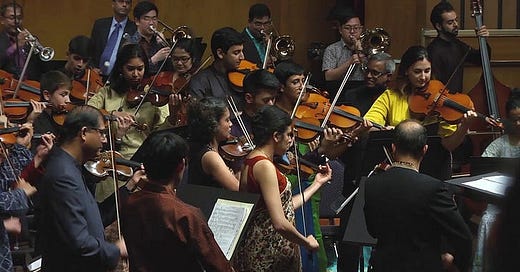The Spirit of South Asia
Last month, The South Asian Symphony Foundation celebrated its third anniversary with an online concert The Spirit of South Asia.
Eleven of SASO’s musicians contributed a piece of music that they recorded, resulting in a programme of enormous variety. A number of the musicians performed their own arrangements or compositions of music connected to South Asia - be it film, folk or classical music. Here are the highlights -
16-year-old violinist from Afghanistan, Amanullah Noori, performed a beautiful rendition of the Pushto folk song “Paimana Bede”, accompanied by Murtaza Muhammadi on the traditional Afghani instrument - the rubab.
Priyanka Venkatesh performed a soulful arrangement of the first movement of Walter Kaufmann’s Fourth Violin Sonata, which was inspired by the raaga Shivranjani. She was accompanied by pianist Vijay Venkatesh.
Next came the foot-tapping hit Sinhalese Baila “Surangani”, by A. E. Manoharan (popularly known as Ceylon Manohar). Nivanthi Karunaratne dazzled, playing the melody on the French horn.
Dilshad Billimoria Posnock rendered on the flute Claude Debussy’s Syrinx (L. 129), which is one of the definitive works composed for solo flute in the western classical canon.
Nepalese violinist Sudhakar Wasti brought forth the sounds the mountains with his interpretation of Nepali singer and composer Gopal Yonjan’s Melodies from Everest, arranged by Rajkumar Shrestha.
Rohan Ramanan performed a beautiful tribute to the late composer Vanraj Bhatia - Rohan’s own arrangement for the English horn or selected excerpts from the film Sardari Begum.
“Adiga Adiga”, a song from the 2017 Telugu film Ninnu Kori was the subject of violinist Farhad Billimoria’s performance. It was an arrangement for violin, keyboard and double bass. He was joined by musicians Vivian Anastasiu and Xiao Qing Shang.
Meera Gudipati performed her composition Javārī Ratios, for flute and electronics. She explained that the piece imitates the overtone series of the sitar. She used whistle tones on her flute to express these.
Vijay Venkatesh performed Johannes Brahms’ Ballade in G minor with elan. Marked “allegro energico” (lively and energetic), this piece is a fiery and passionate oeuvre from the western classical piano repertoire.
Anusha Madapura, the 17-year-old violinist from Bengaluru, arranged, recorded and mixed tracks on her violin to accompany her heartfelt arrangement of A. R. Rahman’s Maa Tujhe Salaam.
Pianist Soundarie David Rodrigo performed a charming arrangement of a medley, combining W. A. Mozart’s Variations on "Ah vous dirai-je, Maman" (the tune we now call “Twinkle Twinkle Little Star”) with A. R. Rahman’s “Chinna Chinna Aasai”.
If you haven’t already watched the concert, please click on the video below to experience the spirit of South Asia. Do subscribe to the SASF YouTube channel to enjoy more such concerts!
The Morning Song of India
The first verse of Rabindranath Tagore’s 1911 hymn “Bharoto Bhagyo Bidhata” was adopted as the national anthem of India in 1950. During a visit to the Besant Theosophical College in 1919, Tagore translated the hymn into English and named it “The Morning Song of India”. The opening verse was translated thus:
Thou art the ruler of the minds of all people, dispenser of India's destiny.
Thy name rouses the hearts of the Panjaub, Sind, Gujarat and Maratha, of the Dravida and Orissa and Bengal.
It echoes in the hills of the Vindhyas and Himalayas, mingles in the music of the Jamuna and Ganges and is chanted by the waves of the Indian Sea.
They pray for thy blessings and sing thy praise.
The saving of all people waits in thy hand, thou dispenser of India's destiny.
Victory, Victory, Victory to thee.
Jana Gana Mana is sung in raag Alhaiya Bilawal with a few variations due to the use of teevra ma, which would be F# in the key of C. The tune was composed by Margaret Cousins, who was an expert on European music and the Vice-Principal of the Besant Theosophical College in 1919.

On the occasion of the 75th Independence Day of India, here is the South Asian Symphony Orchestra performing an orchestral transcription of the Indian National Anthem, Jana Gana Mana, in Bengaluru (October 2019) led by conductor Alvin Seville Arumugam.
Hope & Harmony: A webinar by the Ladies Study Group
On 25th June, the Ladies Study Group (LSG) of Kolkata organised a web discussion entitled “Hope and Harmony: The connectivity of music highlighted with diplomatic notes”. The key speaker was SASF Founder Ambassador Nirupama Rao, in conversation with Rita Bhimani, Founder and CEO of Ritam Communications.
The President of LSG, Sumita Roy, introduced the speakers. The conversation traced key moments of Ambassador Rao’s career, focusing on the intersections between art, culture and diplomacy, as well as peace-building efforts taking place through SASF. Here is a quote from Ambassador Rao:
We shouldn’t think of culture as something that is only about soft power. It is an instrument that furthers your aim and intention to make your country better understood, better admired and better appreciated.
A snippet of SASO’s performance of Rex Isaac’s Bollywood Medley from SASO’s concert Peace Notes, was featured and well-received.
Do click on the video below to watch the complete webinar on the Ladies Study Group YouTube channel.
Written by Aditi Bharatee





